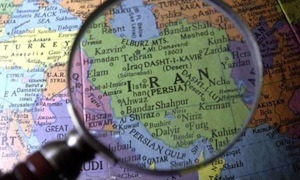Assessment of the Interim Deal with Iran
Click here to read the full report

Preventing a nuclear-capable Iran remains the most pressing national security challenge facing the United States and its Middle East allies, and a permanent diplomatic settlement that fully addresses international security concerns remains the preferred means to achieve this objective. We judge this outcome to be more remote and harder to achieve now than before the P5+1 countries and Iran signed an interim deal in Geneva, known as the Joint Plan of Action (JPA), which went into effect January 20, 2014.
The JPA is intended as an interim arrangement that pauses parts of Iran’s nuclear program during negotiations for a longer-term settlement. But it also sets out so-called “elements of the final step of a comprehensive solution.” We believe the JPA is deeply flawed because the combination of interim and final concessions it contains undermine the effort to prevent a nuclear Iran.
Our previous report, issued in the run-up to Geneva, spelled out six principles to which any deal must conform to protect U.S. national security interests. To be acceptable, we argued any deal must require Iran to resolve outstanding international concerns, adhere to international legal requirements and roll back its nuclear program. It would also need to put in place a strict inspections regime and clear deadlines for Iran to uphold its commitments. Finally, we made the case that to obtain such a deal the United States would have to negotiate and enforce it from a position of strength, to make it unmistakably plain to Tehran that it has the most to lose from the failure of diplomacy.
The aim of this report is to: show where this agreement falls short of the parameters dictated by our principles; explain the risks generated by these shortcomings; and provide recommendations for pursuing a final agreement to prevent a nuclear Iran.
The JPA fails to meet the standards we had previously laid out, both in the interim and the long term. It allows Iran to retain enough key aspects of its nuclear program to continue progress toward nuclear weapons capability – including its 3.5 percent enriched uranium stockpile, existing enrichment capacity and ability to improve the performance of its extant centrifuges – and even authorizes it to construct an additional nuclear facility. But the JPA does not require Iran to address its unresolved legal obligations. Instead, it implicitly recognizes Iran’s proclaimed right to enrich in practice, undermining the Nuclear Non-Proliferation Treaty (NPT), and envisions a time limit on any Iranian concessions. Worse still, it suggests that after the conditions of a final deal lapse, Iran will “be treated in the same manner as that of any” state, as if it had not pursued nuclear weapons in defiance of international law or sponsored global terrorism for more than three decades. Finally, the JPA weakens U.S. leverage to pursue even this flawed long-term deal, both by beginning to unravel the existing international sanctions regime and by seeking to limit Congress’s power to pass additional measures. Overall, this does not buy time for the P5+1 to negotiate a final deal. Instead, the JPA makes it possible for Iran to progress toward undetectable nuclear weapons capability without even violating the agreement.
These shortcomings complicate prevention of a nuclear Iran, undermine the nonproliferation regime and contribute to regional instability. To stave off these risks, the United States must now do the best it can with what time remains to protect its security interests, as well as those of its allies in the region.
As we made clear in our previous reports, this task force continues to believe the optimal outcome would be an Iran with no enrichment capability whatsoever. Because the JPA precludes this, and contains the flaws outlined above, some task force members believe the deal is unacceptable. These task force members believe the United States must still press for a final agreement permitting Iran to keep only a civilian nuclear power program but no enrichment facilities or capabilities.
Other task force members believe the JPA, while not the best solution, provides an opportunity to test Iran’s true intentions definitively with an endgame proposal. By offering Iran much of what it claims to want – civilian nuclear power and enrichment – while also containing the most stringent possible limits to preclude nuclear weapons capability, U.S. negotiators can give Iran the chance to prove whether or not it is serious in its declared peaceful aims. To be acceptable, these task force members believe, a final deal must limit Iran to: no enrichment beyond 5 percent; no 20 percent enriched uranium stockpile, and no more than 1,000 kilograms (kg) of 5 percent; no second-generation centrifuges, and no more than 1,000 installed first-generation centrifuges; deactivation of the Fordow enrichment facility; and no plutonium track.
All task force members agree an acceptable final deal must require Iran to meet all of its international legal obligations, come clean about its past nuclear weapons research and work, and accept a much more intrusive inspections regime.
Given that the JPA grants Iran greater concessions than it extracts, and considering how close Iran is to nuclear weapons capability, it is critical such a final, permanent deal which fulfills our principles be put in place as soon as possible, preferably before the JPA’s six-month interim expires. Achieving this will require the United States to use all forms of leverage available to induce Iran to accept it, including intensified sanctions, credible military preparations, tighter cooperation with regional allies and clear support for a potential Israel strike.
The United States should move immediately to impose new sanctions and consider even tougher actions against Iran if no acceptable final is agreement is in place 180 days after the JPA’s formal implementation on January 20. At that time, the United States should do nothing that would impinge upon Israel’s ability to decide what actions it must take at that time, and indeed should support Israel if it takes military action.